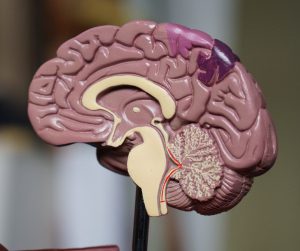Last Updated on July 27, 2023
Alzheimer’s disease is a neurological disease that is the most common cause of dementia. It causes progressive destructive and irreversible changes in the brain. A common feature is the accumulation of a protein called amyloid-β in the form of plaques and tau tangles. Both are thought to cause brain cell death. Although among the most likely candidates, they have not yet been shown to be the cause of Alzheimer’s disease.
In a blog from 2 years ago a newly approved drug for Alzheimer’s disease named aducanumab was discussed. At the time I thought the medication had not been proven to be of any real benefit and should not have been approved. However, aducanumab was approved, though it was revised for use only in those with early disease, not all patients with Alzheimer’s as was done initially. Over time some benefit has been shown and it may still be available for some people with mild Alzheimer’s disease. These are typically those who have been referred to large medical centers with neurologists who have experience with aducanumab and think it may help specific patients.
Up until now there has been no treatment for the disease that has any significant effect on the progression — although some medications can relieve certain symptoms, such as agitation. Patient advocacy groups, such as the Alzheimer’s Association, families, and those with Alzheimer’s disease continue to hope for a breakthrough.
Recently, the picture has changed and two new types of medications for Alzheimer’s disease have been approved, one that can alter the course of Alzheimer’s disease and another that can temporarily relieve some of its symptoms.
- On July 6 the FDA fully approved the monoclonal antibody) by the Accelerated Approval pathway. Lacanemab can be used for those with mild cognitive impairment or mild dementia due to Alzheimer’s disease.
- Brexpiprazole (Rexulti), an antipsychotic medication used in the treatment of major depressive disorder and schizophrenia, has now been approved by the FDA to reduce agitation experienced by at least 45% of those with Alzheimer’s disease. Brexpiprazole joins cholinesterase inhibitors and memantine as FDA approved medications for Alzheimer’s disease. These medications are used for patients with moderate to severe dementia to temporarily slow or manage memory loss.
Unlike the trials with aducanumab, which showed only reduction in levels of amyloid plaques on PET scanning at 18 months, the lecanemab randomized controlled trial involving 1,795 people with early-stage, symptomatic Alzheimer’s disease demonstrated a statistically significant slowing of clinical decline by 27% after 18 months of treatment, including a 26% slowing of decline in a key secondary measure of cognitive function and a 37% slowing of decline in a measure of daily living. No patient experienced improvement in dementia or cognitive function and patients with moderate to severe disease were not included.
Evidence of the effectiveness of brexpiprazole involved two randomized controlled trials that showed a statistically and clinically significant improvement in the Cohen-Mansfield Agitation Inventory (CMAI) score at week 12. The CMAI is a well-studied and widely utilized survey tool that uses input from caregivers to rate the frequency of certain agitated behaviors in dementia patients.
The disease burden from Alzheimer’s is huge, as will be the cost of treatment. There are more than 6.5 million people diagnosed with Alzheimer’s in the United States alone, of which 50.4% have mild disease, so widespread treatment of mild Alzheimer’s disease is going to be very expensive. The newly approved monoclonal antibody lecanemab (Leqembi) will have a hefty price tag that the government will predominantly be responsible for.
- The price tag for one patient is $26,500 per year. If used for all of the 3,276,000 people with mild Alzheimer’s this is $ 86.8 billion (1.2% of the 2023 National Budget of $5.7 trillion) for just the medication. Additional costs will include brain-imaging, cognitive and functional tests, infusions, and provider visits.
- Since Alzheimer’s disease primarily occurs in seniors, the federal government will be picking up 80% of the tab through Medicare — some of which comes from income taxes.
- States will contribute since many patients with Alzheimer’s disease, including those on Medicare, are on Medicaid.
Brexpiprazole will not have a similar impact on treatment costs.
Another cost of treatment is the side-effects of the medication which include headache, visual changes, worsening confusion, cranial swelling or bleeding, and brain shrinkage. A comprehensive list of side effects can be found at drugs.com.
Although lecanemab has been proven to be effective, it is only approved for those with mild Alzheimer’s disease and the improvements are only moderate. It is not appropriate for many patients, and the cost may be prohibitive. However, in the absence of any current alternatives, lecanemab is a welcome addition in the treatment of Alzheimer’s.
Since much of this care is only available at specialized memory and aging centers it will take time and money to build up the resources necessary to care for patients taking lecanemab and make it more generally available for the large number of people who could be prescribed the medication. Initially the wait times will be long, and the number of treated patients being treated will be small.
It must be noted that some people are at higher risk of side-effects from, such as people:
- Taking blood thinners.
- Who have symptomatic chronic diseases like poorly controlled diabetes, hypertension, or cancer;
- With other forms of dementia; and
- With certain genetic risk factors — ironically, a genetic risk factor for Alzheimer’s disease, the apolipoprotein E4 (APOE4) gene, is also a risk factor for cerebral bleeding when taking lecanemab.
Fortunately, the story does not stop here and there are many new treatments on the horizon. Donanemab is another monoclonal antibody that has also shown clinical benefits. Other medications are being studied that target aspects of the disease other than reducing plaque formation, such as blocking production of amyloid-β, preventing tau tangling, improving synaptic functioning, or reducing brain cell inflammation associated with Alzheimer’s disease. Here is a link to detailed information about current and future treatments for Alzheimer’s disease. The NeedyMeds Diagnosis Information Page for Alzheimer’s Disease has information on commonly prescribed medications, links to programs that may provide prescriptions at low or no cost, and other resources available for those affected by Alzheimer’s. For further assistance navigating available resources, call our toll-free helpline at 1-800-503-6897.





